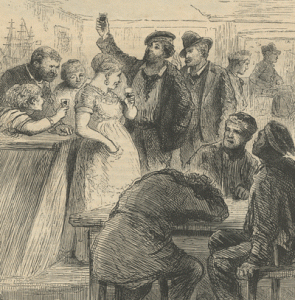 Despite a concerted effort by the establishment in the late nineteenth and early twentieth century to create an image of professional, respectable men, Jack’s licentious proclivities ashore have continued to form a key part of his popular image.[1] Yet what did sailors themselves record on the subject of sex? Christopher McKee has argued that ‘most ratings found it impossible to talk or write about shore leave… without their thoughts and their words wandering off to the subject of sex.’[2] So far in my study of the diaries held by the National Museum of the Royal Navy in Portsmouth I have not found this to be the common topic suggested by McKee. However, one diarist I recently came across gave a lengthy description of prostitution in Malta when he visited the port in 1912.
Despite a concerted effort by the establishment in the late nineteenth and early twentieth century to create an image of professional, respectable men, Jack’s licentious proclivities ashore have continued to form a key part of his popular image.[1] Yet what did sailors themselves record on the subject of sex? Christopher McKee has argued that ‘most ratings found it impossible to talk or write about shore leave… without their thoughts and their words wandering off to the subject of sex.’[2] So far in my study of the diaries held by the National Museum of the Royal Navy in Portsmouth I have not found this to be the common topic suggested by McKee. However, one diarist I recently came across gave a lengthy description of prostitution in Malta when he visited the port in 1912.
CPO Robert Percival recorded that he ‘found a good deal of the steamy side of life in Malta’ when he visited the island whilst on manoeuvres with the Mediterranean Fleet.[3] He continued that the Maltese ‘cater for the seafaring fraternity [and] take advantage of the simple and childish minds of sailor men’.[4] This in itself is interesting as the perceived childlike nature of sailors was increasingly being countered by men from the lower deck at this time.[5] However, Percival is not taking a moral high ground. Instead he gives an account of his own visit to a brothel and, in passing, noted that ‘the majority of these houses are as low as any to be found in the Ratcliffe Highway or Chatham Brook’ suggesting some familiarity with similar establishments in England.[6]
Percival went on to describe the brothel, stating that it ‘had some pretence to being called a music hall, but the only difference I could see were that the women were more showy and more underdressed’.[7] This was reflected in the cost and apparently ‘required the purchase of a sixpenny ticket which made it what would be called in England – select.’[8] Interestingly Henry Trotter has argued that sailors ‘wanted more than sex; they desired it to be wrapped up in a package of broader social interaction’.[9] After all, sailors were not simply interested in sex but wanted to enjoy female companionship.[10]
Percival continued his appreciation of what Malta had to offer sailors and wrote: ‘it [prostitution] is recognised and no mistakes can be made as I have seen in England where respectable women are accosted by mistake and unpleasantness is often the result.’[11] His acceptance is further demonstrated in his concluding remark, saying that ‘one feels no more embarrassed when going… than one would feel in going to one’s barber or shoe maker.’ Whilst this account cannot be taken as representative of all sailors, it describes a thriving trade established in a port to cater specifically for “the seafaring fraternity” where such activities could be engaged in without judgment.
Notes
[1] This article is not an engagement with the womanizing stereotype but rather to demonstrate what sailors wrote about such things, and share what I have come across in my own research. For more on the representation of naval manhood see Mary A. Conley, From Jack Tar to Union Jack: representing naval manhood in the British Empire, 1870-1918, (Manchester: Manchester University Press, 2009).
[2] Christopher McKee, Sober Men and True: Sailor Lives in the Royal Navy, 1900-1945, (London: Harvard University Press, 2002); p. 174
[3] RNM 1988/294: Diary of Robert Percival. Robert Percival was a Chief Petty Officer in the Stoker branch serving aboard HMS Lancaster.
[4] RNM 1988/294: Diary of Robert Percival
[5] Conley, From Jack Tar, p. 68
[6] The Ratcliffe Highway is a district in London near Wapping and as such frequented by sailors. Likewise Chatham Brook is located near the Chatham Docks.
[7] RNM 1988/294: Diary of Robert Percival
[8] RNM 1988/294: Diary of Robert Percival
[9] Henry Trotter, ‘Dockside Prostitution in South African Ports’, History Compass, 6, 3, 208; pp. 673-690, p. 678
[10] McKee, Sober Men, pp. 175-176
[11] RNM 1988/294: Diary of Robert Percival. Dockyard prostitutes were enabled some anonymity as they catered specifically for foreign sailors who could not therefore expose them. See Trotter, ‘Dockside’, pp. 673-674










That’s interesting Simon. Have you come across Folkestone in the First World War where the Chief Constable ejected 37 people for prostitution under DORA 13a in February 1916? I don’t seem to be able to make the link between Folkestone and why prostitution was so rife there. It had 100,000 Belgian refugees landing there in a very short time & was also a main crossing port for British, French & German soldiers. Are you able to make a link?
Interesting! https://frisiacoasttrail.blog/2022/03/19/harbours-hookers-heroines-and-women-in-masquerade/